6 Questions with Patrick Schumacker
The Harley Quinn showrunner + Abbott Elementary EP is our March 3 Q&A guest!
Are you sick of me telling you that the guests we have for these Q&As are the nicest and more talented writers I know? Well too bad, because they all are. I’ve been lucky enough to meet and befriend so many ridiculously talented but also unbelievably kind people in my years in this business.
Patrick Schumacker and his writing partner Justin Halpern (whose 6 Answers you’ll read next week) are no exception. I met the guys in 2014 on a truly unhinged live Writers Panel episode that also featured Community’s Dan Harmon and Chris McKenna and White Collar’s Joe Henderson (who held his own as the sole drama writer of the group!). Schumacker and Halpern had a new show on Fox called Surviving Jack, and they’d just come off of wild success and wild, um, non-success with their first show, $#*! My Dad Says, based on Justin’s wildly popular Twitter feed.
The whole thing was wild. It’s worth a listen as both a snapshot of television at the time, when network comedy was struggling, and because all of these guys are not just hilarious but have genuinely helpful and smart advice about writing comedy.
You’ll get more great advice from Patrick and Justin on Sunday, March 3, at 6pm PT, when they’re our live Zoom Q&A guests! Imagine what they’ve learned with another decade of experience. You don’t want to miss this one.
6 Questions with Patrick Schumacker
1. What you working on right now?
We are smack in the middle of production on Season 3 of Abbott Elementary, which is taking up the lion’s share of my time. We are also in post on Kite Man: Hell Yeah! (Harley Quinn spinoff, hopefully out this year!), and in production on Harley Quinn Season 5 (hopefully out in our lifetimes). We’re also prepping a handful of pitches for some potential TV series (a couple half-hour comedies and a lighter hour-long). Bottom line: I’m working on my time management.
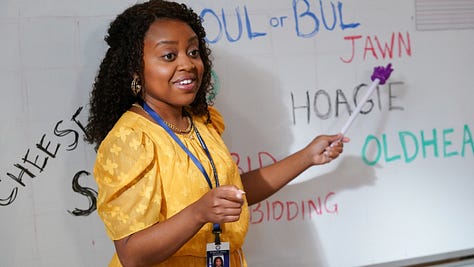
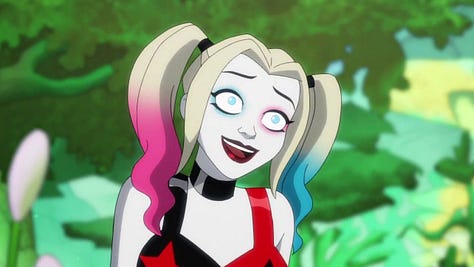
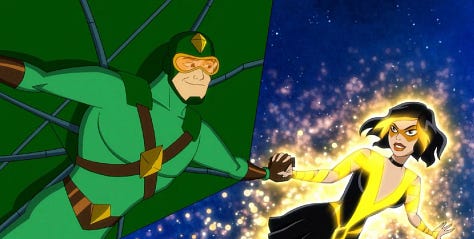
2. What challenges are you facing specific to your current writing project?
On Abbott, it’s the expected challenges of broadcast schedule deadlines, while keeping up the quality. Fortunately, we are in Season 3 and—knock on wood—our hours continue to be possibly the sanest and best in all of television, especially for the writers.
Honestly the biggest challenge for me, mentally, has been working on pitches for new projects and getting momentum on those while also trying to co-run a broadcast show that is writing, prepping, shooting and posting while ALSO airing. Not a ton of spare time.
And on top of that, it’s not exactly a seller’s market right now coming out of the strike. We’ve just experienced how hard it is first-hand, having taken out a pitch we were confident would sell somewhere and getting a litany of rejections. Despite having worked consistently in this business for 15 years, and certainly having experienced plenty of rejection in that time, this post-strike lean era we are in, while hopefully fleeting, feels like it’s going to be a real challenge for everyone trying to pitch.
3. What advice about the business of TV/film writing can you give to someone starting out now?
Steel yourself. Gird your loins. Do some breathing exercises. I don’t think it’s hyperbole to say that this is one of the toughest times to break into the business maybe ever. Don’t quote me on the exact figures, but I believe we had roughly 600 scripted series on the air last year, and this year it’ll be reduced to something like 400. 400 still seems like a lot, but that’s still a 33% drop in series being made, which means a ton of working writers newly out of work, and snapping up jobs that might have gone to greener candidates. We’ve heard execs and reps telling their kids not to get into comedy writing AT ALL, because they think it’s a fool’s errand to pursue it. I choose not to take such a dire outlook on things. I do think we—and when I say “we,” I mean writers of all experience levels—are in for a long year.
But you have to have patience and nerves. It took us about seven years of writing specs and entering script competitions and pounding the pavement to break into TV, and even then, it was almost by freak accident when Justin decided to start a twitter account against his better judgment.
But on a more practical level, my advice to those starting out would be to get ANY job you can that’s a degree or two away from the writers room. No one is going to move to L.A. and land a writers assistant gig right away. But if you widen your net to opportunities that exist in the orbit of the writers room—e.g, working an entry level job in the production office, on the crew, in a studio exec’s office—and then you put yourself out there and meet enough people, you’re going to at least give yourself access to writers.
And I’m not saying landing any entry level job is easy. It’s still a grind. But don’t dismiss an opportunity that comes your way just because it’s not in a writers room.
4. What advice about the craft of writing can you give to someone starting out?
Find someone or a handful of people who can be your “first reader.” This is the person or persons whose opinions you value greatly, and who you know will always give you an honest, good faith critique of your efforts. (I think the “first reader” label is straight out of Stephen King’s On Writing book, which, if you haven’t bought already, spend the money; it’s perfect.)
Ideally this First Reader will be a fellow writer, because then you can return the favor and you’re gaining invaluable experience reading and dissecting others’ work, which is only going to make you better in return. But it doesn’t have to be another professional or pre-professional writer. Anyone whose narrative opinion you respect is fair game. My wife is an architect but I think she has the mind of a writer, and she’s still one of the first people I go to for a first opinion on something, and it’s paid off immensely, even today. So find your first reader. You never know: they could become your spouse!
Bonus tip: If you’re looking to write samples for TV staffing, and you’re hemming and hawing between writing an original piece versus a spec of an existing show, I would recommend writing the original ten times out of ten. I’ll get into the specifics of why in question #5’s answer, but as someone reading your material, I want to read something that’s cut whole cloth from your brain. It’s one thing to write a spec of an existing series if that’s a requirement for a fellowship program. Or if you’re doing it as an exercise. But as a sample for staffing, go with something 100% you.
5. What do you respond to most in a piece of writing?
It depends on the level of writer I am reading and in what context. I’m going to focus this answer on the context of staffing a show at the lower level.
When we are looking for staff writer or story editor level writers on a new or returning show, we’re responding to the originality of the voice, and particularly how much the writing is making us laugh. Comedy has been 99% of our focus, and I don’t see that changing any time soon. So we care deeply about whether or not the material is making us laugh. Anyone can learn structure. Anyone can glean how to adhere to a certain narrative formula with enough experience. But you can’t teach someone a pure, original, comedic point of view that turns something expected on its ear.
TL;DR: Not every fart joke has to be stale; with enough personal flair and ingenuity, you can make that fart fresh again.
6. What are you watching/reading/listening to lately that’s getting you excited or inspired?
I’m late to the game, but I just binged all available episodes of The Righteous Gemstones. I think I stayed away from it because, to me, Eastbound & Down is in the pantheon of all-time greats and I thought this would only pale in comparison, but I absolutely fell in love with what Danny McBride and company are doing, skewering the hypocrisy of megachurches in hilarious, gonzo fashion while also making layered characters whose flaws feel real and are presented with a loving hand. I think it’s brilliant and stupid all at once and that’s the highest compliment I can give any work of art.
I’m also catching up on an insurmountable stack of comic books and graphic novels. Minor Threats by Jordan Blum, Patton Oswald, and Scott Hepburn is a killer new universe that’s poised to rival Lemire’s amazing Black Hammer books, as far as I’m concerned. I’m also having a blast with Daniel Warren Johnson’s Transformers, Robert Kirkman and Lorenzo De Felici’s Void Rivals, and the rest of the newly minted “Energon Universe” from Skybound and Image.
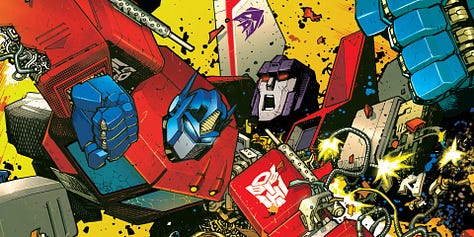
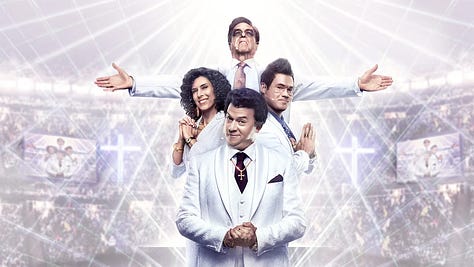
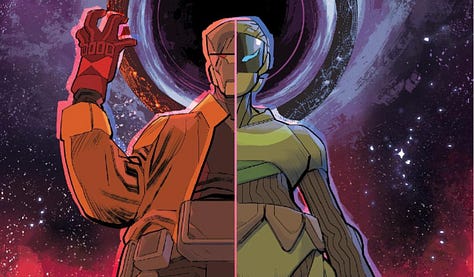
And yes, because you’re definitely wondering, I did see MADAME WEB and if I can’t eventually get a full 800-page behind-the-scenes oral history, I will gladly settle for Paul Scheer and company doing a How Did This Get Made podcast episode dedicated to it. It’s truly wild. I had a blast. Sign me up for Kraven the Hunter.
I promise can’t our Q&A with Schumacker and Halpern on March 3 won’t ONLY be about Madame Web, but I can’t promise it won’t be either.
Upgrade to join us! Next week: Justin’s A’s and the info for the 3/3 live Q&A.




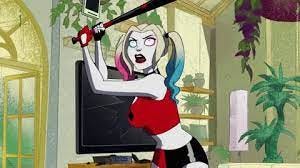

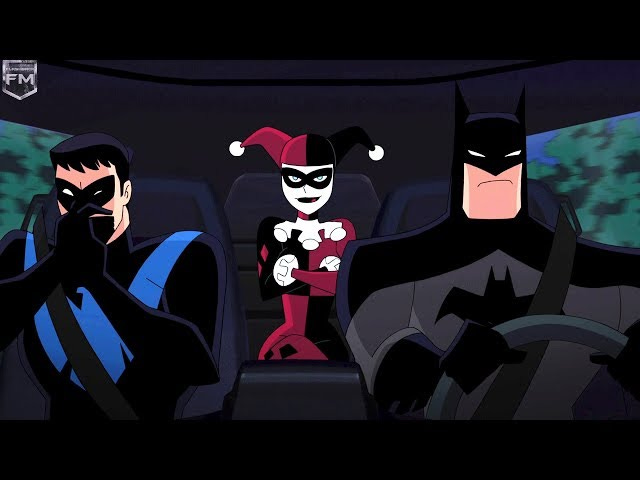

HOLY SHIT